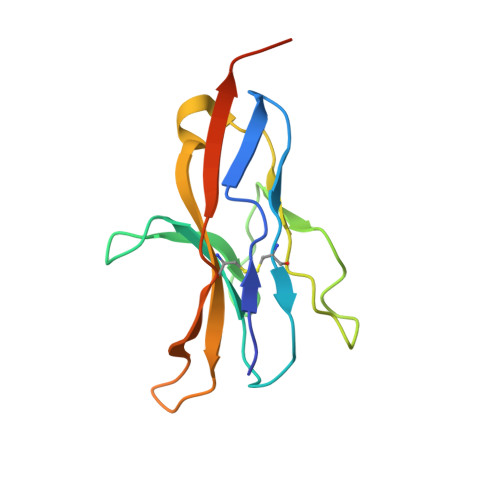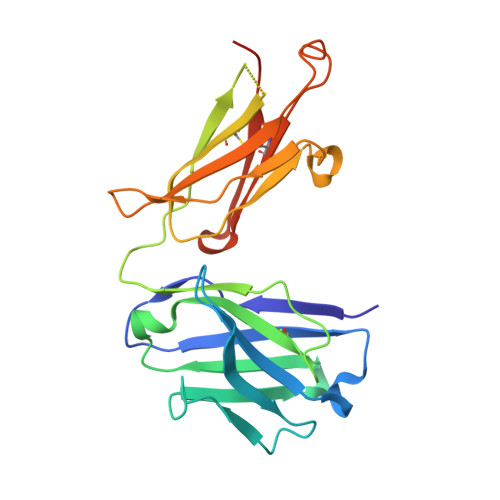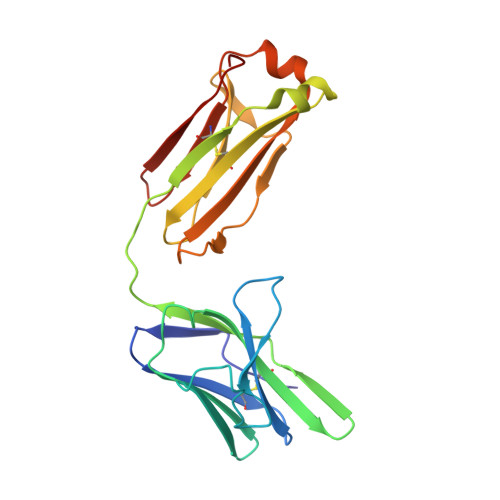Discovery of high affinity, pan-allelic, and pan-mammalian reactive antibodies against the myeloid checkpoint receptor SIRP alpha.
Sim, J., Sockolosky, J.T., Sangalang, E., Izquierdo, S., Pedersen, D., Harriman, W., Wibowo, A.S., Carter, J., Madan, A., Doyle, L., Harrabi, O., Kauder, S.E., Chen, A., Kuo, T.C., Wan, H., Pons, J.(2019) MAbs 11: 1036-1052
- PubMed: 31257988
- DOI: https://doi.org/10.1080/19420862.2019.1624123
- Primary Citation of Related Structures:
6NMR, 6NMS, 6NMT, 6NMU, 6NMV - PubMed Abstract:
Targeting the CD47-signal-regulatory protein α (SIRPα) pathway represents a novel therapeutic approach to enhance anti-cancer immunity by promoting both innate and adaptive immune responses. Unlike CD47, which is expressed ubiquitously, SIRPα expression is mainly restricted to myeloid cells and neurons. Therefore, compared to CD47-targeted therapies, targeting SIRPα may result in differential safety and efficacy profiles, potentially enabling lower effective doses and improved pharmacokinetics and pharmacodynamics. The development of effective SIRPα antagonists is restricted by polymorphisms within the CD47-binding domain of SIRPα, necessitating pan-allele reactive anti-SIRPα antibodies for therapeutic intervention in diverse patient populations. We immunized wild-type and human antibody transgenic chickens with a multi-allele and multi-species SIRPα regimen in order to discover pan-allelic and pan-mammalian reactive anti-SIRPα antibodies suitable for clinical translation. A total of 200 antibodies were isolated and screened for SIRPα reactivity from which approximately 70 antibodies with diverse SIRPα binding profiles, sequence families, and epitopes were selected for further characterization. A subset of anti-SIRPα antibodies bound to both human SIRPα v1 and v2 alleles with high affinity ranging from low nanomolar to picomolar, potently antagonized the CD47/SIRPα interaction, and potentiated macrophage-mediated antibody-dependent cellular phagocytosis in vitro . X-ray crystal structures of five anti-SIRPα antigen-binding fragments, each with unique epitopes, in complex with SIRPα (PDB codes 6NMV, 6NMU, 6NMT, 6NMS, and 6NMR) are reported. Furthermore, some of the anti-SIRPα antibodies cross-react with cynomolgus SIRPα and various mouse SIRPα alleles (BALB/c, NOD, BL/6), which can facilitate preclinical to clinical development. These properties provide an attractive rationale to advance the development of these anti-SIRPα antibodies as a novel therapy for advanced malignancies. Abbreviations : ADCC: antibody-dependent cellular cytotoxicity; ADCP: antibody-dependent cellular phagocytosis; CFSE: carboxyfluorescein succinimidyl ester; Fab: fragment antigen binding; Fc: fragment crystallizable; FcγR: Fcγ receptor; Ig: immunoglobulin; IND: investigational new drug; MDM⊘: monocyte-derived macrophage; NOD: non-obese diabetic; scFv: single chain fragment variable; SCID: severe combined immunodeficiency; SIRP: signal-regulatory protein.
- a ALX Oncology, Departments of Protein Sciences and Translational Biology , Burlingame , CA , USA.
Organizational Affiliation:


















